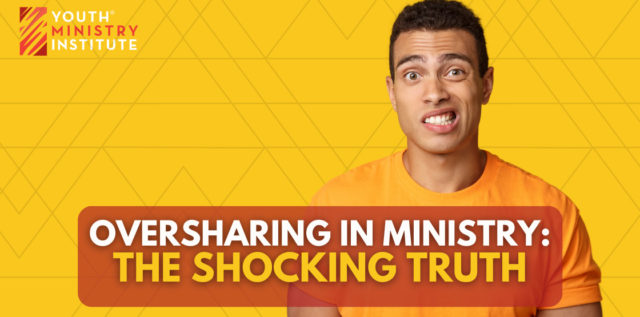Oversharing In Ministry: The Shocking Truth – Are You Guilty?

Matt, who had been serving as a summer youth ministry intern, was excited to share a devotion with his middle school group. It started strong, but as he began to share about a relationship that had ended just a few weeks earlier, he began crying. His cry was not just a little crying but a full-on sobbing type. The middle schoolers felt for him and even showed him great empathy. But the devotional stopped short of Scripture reading, prayer, or even understanding where God was in Matt’s story.
It wasn’t bad that Matt shared a painful place in his life. The trouble was that he was still living this part of his story. Matt hadn’t reached a place where he could share coherently. Where God was moving in his life was missing in Matt’s story.
Matt had fallen into the oversharing trap.
Do you know the balance between transparency and oversharing in ministry? Do you know why transparency matters? And have you seen the pitfalls of oversharing?
The Pitfalls of Oversharing In Ministry
At times oversharing can be driven by a desire for sympathy or attention. And the truth is, you may really need someone to empathize with you.
You may feel tired, overworked, or burdened as a leader, so we share our struggles to elicit sympathy. However, this oversharing is ultimately selfish and may not be conducive to building trust and credibility with the young people we serve.
It is crucial to recognize when we need support. Having appropriate spaces, such as friends, counselors, mentors, or coaches, to share our challenges helps us be the healthiest versions of ourselves. And being healthy makes it possible for us to challenge unhealthy motives for sharing.
Age-Appropriate Sharing
Another aspect of oversharing in ministry is sharing without considering the developmental stages and needs of the young people we serve. It is essential to exercise caution and wisdom when deciding what aspects of our lives to share with young people.
Failing to recognize the appropriateness of our sharing can lead to upset parents and strained relationships. Had Matt gone into further details about his relationship, we may have gotten phone calls from angry youth group parents. Therefore, it is crucial to carefully evaluate our audience’s age and developmental stage before deciding what to share.
Sharing in Challenging Seasons
During times of personal crisis, we may feel compelled to share our experiences and struggles with young people. But you should ask yourself whether you can communicate coherently and have had adequate time to reflect on God’s movement in those spaces.
Sharing with young people may not achieve the desired outcome when we are still in a painful situation. While it can elicit sympathy and build relationships, it may not be healthy for the spiritual development of young individuals. In such situations, seeking support and leaning on others while being cautious about oversharing is essential.
The Power of Authenticity and Transparency
Finding the balance of transparency and sharing the right amount can deepen our ministry relationships. It invites others into the story God is writing in our lives. Transparency helps build trust with those we serve, which is vital in guiding young people in their faith journey. Authenticity involves being brave enough to be ourselves and genuine enough to live according to our values.
As youth and children’s ministers, we should share appropriate aspects of our lives with our communities. Volunteers need to see that our families are real and our homes are not always perfect. Young people need to hear about our moments of doubt and struggle with our faith. Those in our ministry should witness the highs and lows of our lives, as this cultivates trust and relatability. At the same time, we need to be sure to share appropriately.
Transparency and authenticity are powerful tools that help guide and inspire others on their faith journey. So how do you use them well? In what ways do you avoid the pitfall of oversharing in ministry?

Rev. Brian Lawson is the Director of Leadership Development and Client Services for YMI and has served in youth ministry since 2004. He also serves as a pastor in the Florida Conference of the UMC. Brian holds a Master of Ministry with a focus in organizational culture, team-based leadership, change, conflict, and peacemaking from Warner University. In addition to his degrees from Warner, he studied Christian Education at Asbury Theological Seminary. Click the social links below to engage with Brian.


We Would Love to Hear Your Thoughts